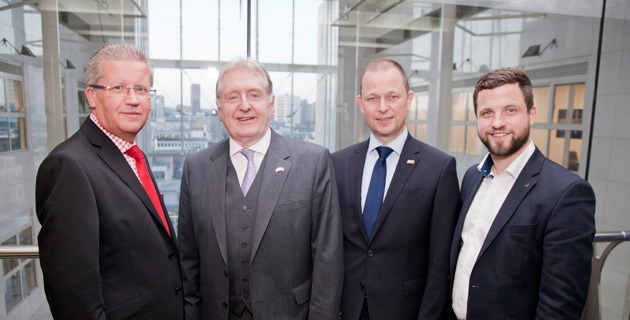Eastern Europe and Turkey have dynamic, modern economies which offer myriad opportunities for Yorkshire businesses wishing to trade beyond the main EU markets of Germany, France and Italy, the seventh Export Network event in Leeds heard.
Eastern European economies are catching up with the rest of the EU and believe that trade with the UK can be a stepping stone to greater prosperity, while Turkey is seeking opportunities to build its own its own blue-chip global businesses, the event at Deloittes on March 27 heard.
Chief executive of British Romanian Chamber of Commerce, Richard Reese, said Poland, Romania, The Czech Republic, Hungary, Bulgaria, Slovenia and the Slovak Republic are far more modern than many people perceive.
Richard said: Romania has the fastest Internet in Europe and the third fastest in the world. These are all competitive emerging markets forecast to grow at three per cent in the coming years – faster than the EU as a whole – and with an affluent population and a keen, hard-working, English-speaking workforce.
Outlining the specialist support available through the UK Government’s International UK Business Network – formerly OBNi – he said that although GDPs in East European countries is slightly lower than within the EU, they were rising.
He said that it was widely accepted that there were too few British products – which are well perceived – in Eastern European countries with particular regard to clothing, textiles and healthcare. Opportunities exist in manufacturing and engineering, energy, pharmaceuticals, healthcare and life sciences, food and drink, financial and professional services and IT.
Richard added: When it comes to trading with Eastern Europe, the UK is not as good at picking the low hanging fruit as France, Germany and Italy. This is an imbalance which needs to be corrected.
Director of British Polish Chamber of Commerce, Patrick Ney, said that there can be significant commercial rewards for businesses wishing to create a budget and a focused strategy for trading with Poland. His chamber and its partners had helped, 2,000 UK businesses trade there in the last two years.
Chairman of the British Chamber of Commerce in Turkey, Chris Gaunt, said Turkey is among the world’s biggest markets with a population of 76m – half of who are aged under 30 – and a labour force of 28m. With an GDP of $188bn, Istanbul’s GDP exceeds that of many EU countries.
Chris said: Turkey is a sophisticated market. If you are approaching cities such as Istanbul you should regard it as a developed market whereas some of the smaller cities need an ‘emerging market’ approach.
There are 145,000 Turkish entrepreneurs operating in Europe, employing 627,000 people and with €636bn worth of business. Turkey is good at supporting other global brands but they wish to create Turkish global brands and would like to get that support from the UK which they trust and like doing business with.
Chairman of Wetherby-based software toolkit supplier, NDL Software Ltd, Gordon McClure, who was among the delegates, says: We supply toolkits to integrate disparate back-office systems and develop offline, cross-platform mobile business applications.
We have done this highly successfully in the UK for 30 years and have given more than 200 UK public sector organisations across local government and the NHS the ability to integrate and mobilise their systems.
My role is to investigate opportunities, in the UK and abroad, to grow the business beyond our strengths in local government, housing and healthcare. Our exports are currently only between one and two per cent and are mainly to Ireland but we aim to export 50 per cent of our turnover by 2020.
The Export Network event was very useful because it brought me up to date with the changes in UKTI, chambers of commerce and government support for exporters in recent years. In doing so, the event supported and clarified my previous assumption that expanding our level of exporting will require significant time and resources from NDL.
All the speakers flew in specially for the event which was also attended by Ghana High Commissioner, Victor Smith, a member of his staff, Kofi Addo and Rwanda High Commissioner, Williams Nkurunziza.
The We are International campaign is a LEP initiative in partnership with international trade specialists Chamber International, UK Trade & Investment (UKTI) Yorkshire, Enterprise Europe Network and MY Export Hub – aims to add £1.6bn to the City Region economy and create thousands of jobs by 2018.
For more information about the We are International campaign, visit www.weareinternational.co.uk







